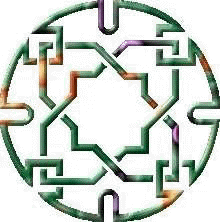



Professor Muhammad Alhabib (Abu Ya'arub) Alarzouki (b. 1947) a Tunisian thinker, defends an Islamic philosophical position on the basis of the historical and structural unity of human thought.
Professor Abu Ya'arub was born in Benzert, Tunisia, on 1947, earned the license degree in philosophy from Sorbonne on 1972, and 'State Doctorate' on 1991. He Taught philosophy in faculty of arts university of Tunisia (I), and appointed as the manager of the translation institute (Bayt Alhekm) in Tunisia, afterwards he traveled to the International Islamic University in Malaysia to teach Islamic philosophy.
His Philosophical Project
We can say that the Tunisian Arabic thinker Abu ya'arub Alarzouki has managed to accomplish the first step, which is undoubtedly the most difficult, toward a new contemporary Arabic philosophy that does not contradict religion but moves under its shadows and guided by its orientations. Probably Almarzouki's success in this returns in the first place to the fact that he gained experience in both domains, the religious and the philosophical, the Islamic and the western. Through this experience he started to entrench a new methodology through which he purports for philosophy to restore its pioneering role in the philosophical and religious construction [of the Islamic thought] . Almarzouki's interests are not limited to philosophy but extend to other areas that belong to political and civilizing conditions of Arabic/Islamic renaissance. In fact he possesses the needed tools for research in such a project, for he is fluent in international languages such as English, French and German. (Introduction of a dialogue with Muhammad Alhourany, Alarabi Magazine, January 2005)
The central concept of the philosophical project of professor Abu Ya'arub is that the historical thought of humanity is unified and this includes both the philosophical and the religious thoughts. For it is not possible to separate the rational (philosophical) thought from belief (religion) since we have in the end to base our rational thought on some end (basic) believes. Therefore, professor Abu Ya'arub presents a historical as well as structural conception, at the same time, of such a unified history of human thought. Almarzouki, then, introduces a conception of such a thought in which both Ibn Taymeyah (a well known Islamic reformist lived in the tenth century) who introduced Nominalist (or logical, structuralist) conceptions, and Ibn Khaldoun (the well known Islamic philosopher of history and society) who introduced social and historical (or evolutional) conceptions, together, occupy a revolutionary position.
With this understanding, the philosophical project of professor Abu Ya'arub is essentially Islamic, because it introduces a specific view of Islamic 'philosophical and theological' thought as the basis for an all encompassing human thought. However, Almarzouki does not depend on 'classical' or 'theological' interpretations of the Islamic heritage (Al-Turath, in Arabic). On the contrary, he criticizes all the previous interpretations on the basis that it was unable to comprehend the unifying principles of human thought, and separated itself from it, and hence, were incapable of presenting the correct form of the humanistic Islamic thought.
The basic traits of his project can be found in "Reformation of Reason in Islamic Philosophy- from Aristotle and Plato's realism to Ibn Taymeyah and Ibn Khaldoun's nominalism" (1994), "the Unity of the Religious and Philosophical thoughts" (2001), and "Cognitive and Idealistic Paradoxes in the philosophical thought of Ibn Khaldoun" (2006).
On the methodological level, professor Abu Ya'arub depends essentially in realizing his project, first, on formal logic. For, he puts much effort to guarantee the logical relation of the different concepts and consistency between them. Second, he depends on coning new terms or new formations of already existing terms, in an effort to fulfill the requirements of his logical methodology. Third, he adopts, in addition, a structuralist methodology in the general sense. So, he places effort on constructing a general holistic structure for the subject under study, in which every details and concepts are put in consistence within this general structural framework.
Some Texts of His Works (in Arabic)
The Problematic of the Whole and its Role in the History of Arabic Thought – the Introduction of 'Reformation of Reason in Arabic Philosophy', Centre of Arabic Unity Studies, 1994, P. 13-29.
The Concept of Philosophy and its Necessary Historical and Structural Conditions – Contemporary Arabic Philosophy, the House of Thought, Syria, 2001, P. 53-76.
His Most Important Works (in Arabic)
The Concept of Causation of Alghazali, 1979.
The Theoretical Khaldounian Sociology, 1983.
The Alternative Epistemology, 1986.
Reformation of Reason in Arabic Philosophy, 1994.
Horizons of Arabic Renaissance, 1990.
The Relation between Absolute Poetry and the Qur'anic Miracle, 2000.
Manifestations of Arabic Philosophy, 2001.
Cognitive and Idealistic Paradoxes in the Philosophical Khaldounian Thought, 2006.
Articles and Dialogues (in Arabic)
Ibn Taymeyah and Ibn Khaldoun participate in the Historical Rout of the Theory of Knowledge, a dialogue with Muhammad Alhourany, Alarabi Magazine.
A Thoughtful Dialogue between Abu Ya'arub Almarzouki and Hassan hanafi, Alsharq Alawsat Newspaper.
Paradoxes of Contemporary Islamic Discourse 1/2
Paradoxes of Contemporary Islamic Discourse 2/2
By: Samir Abuzaid